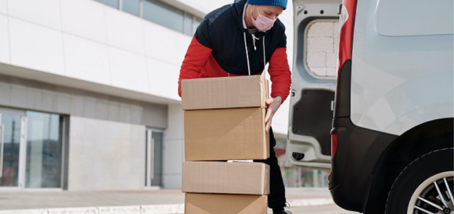-
ROSSLARE EUROPORT TARGETS HEALTH & SAFETY WITH CAMERA TELEMATICS PARTNERSHIP - 2 days ago
-
Landmark Study Reveals Wearable Robotics Significantly Boost Safety and Efficiency in Industrial Environments - July 24, 2024
-
Visku Tackle The Retail Seasonality Challenge One Pallet At A Time - July 22, 2024
-
KAMMAC AND BERGEN LOGISTICS STRENGTHEN FASHION & LIFESTYLE SERVICES IN THE UK - July 19, 2024
-
TENTBOX EXTENDS PARTNERSHIP WITH ARROWXL TO SUPPORT INCREASING DEMAND - July 17, 2024
-
The Perfume Shop improves customer journeys while driving profitability in partnership with Scurri - July 17, 2024
-
ZEROMISSION SECURES £2.3M ($3M) INVESTMENT TO ACCELERATE ELECTRIC FLEETS - July 16, 2024
-
BCMPA CELEBRATES SUCCESS OF 2024 CONFERENCE - July 15, 2024
-
Best of the Best: Jungheinrich Celebrates Triple International Award Win - July 12, 2024
-
GOPLASTICPALLETS.COM CALLS ON NEW CHANCELLOR RACHEL REEVES TO CONSIDER PLASTIC PACKAGING TAX REFORM - July 10, 2024
Businesses have barely had a chance to catch up following one of the most challenging years for online retail. When the COVID-19 pandemic hit, online sales soared, and retailers found themselves managing peak level sales with vastly reduced staff numbers due to social distancing. This led to big delays in the supply chain, a backlog of deliveries, and exposed the lack of contingency measures in many eCommerce delivery strategies.
With Christmas around the corner and the Brexit transition period ending in a matter of weeks, businesses must act now to ensure they have the right contingency measures in place to avoid the delays that so many experienced at the beginning of the year.
The pitfalls of relying on one carrier for all your shipping needs
When delivery carriers reach maximum capacity, it is not uncommon for them to stop taking collections, refuse orders, or ‘switch off’ non-core services such as two-person deliveries, for example. With ‘peak on peak’ demand looming, it is highly likely carriers will do this to safeguard their services. This makes it very risky for retailers who rely on one carrier for all their shipping needs, because if the carrier runs into problems, their parcels will have nowhere to go.
Instead, retailers should look to spread their shipping needs across a range of carriers rather than relying on one. This way, they can be sure they have a safety net should any issues arise. An additional benefit of using multiple carriers is that you can select ones that are tailored to suit your customers and products, too. Evidence suggests that having a choice of delivery options at the checkout is vital for customers, who are always on the lookout for convenient delivery options. Adopting this strategy not only gives you more cover, but it may be the factor that clinches the sale.

Boost warehouse productivity and efficiency with the right technology
Post-purchase, the challenge for retailers is to continue to manage customer expectations while maintaining the right stock levels in the warehouse. A first good step might be to enable tracking notifications for your customers. Once they have ordered their items, consumers will want to know where their parcel is and when it is expected to arrive. Providing them with a quick and easy way of accessing this information will mean you can boost customer satisfaction and save yourself time dealing with queries.
Automating your labelling and despatch processes could be another way to help boost warehouse productivity. Printing and labelling shipments manually is not only time consuming but leaves more room for error. Nowhere is this more critical than with cross-border shipping, where retailers can risk fines if there is incorrect labelling or documentation. As we move beyond Brexit, having a platform that will automatically generate the right documents will give you peace of mind that your carriers will not get held up at customs.
To complete the process, the same focus should be given to preparing for post-Christmas returns. They may be a logistical nightmare, but returns are a fact of peak season selling. Not only that, but they are increasingly important to customers too, with as many as one of five abandoning a purchase if they dislike the returns policy.* Using analytics to increase visibility over your shipments will mean that you can better track and prepare for returns. This will prove invaluable during peak season as any hold-ups can be identified in advance, helping you to reduce the amount of stock sat in the warehouse and capitalise on new year sales by getting sellable items back to market as soon as possible.
A multi-carrier partnership to help you weather the storm
2020 has been a year like no other. With COVID restrictions still widely in place and Brexit just round the corner, Christmas is set to be like no other too. To prepare, retailers must plan early, improve warehouse efficiencies and work with multiple carriers and to ensure they have back-up no matter what. For those looking for a cost-effective way of managing all this, partnering with a single independent multi-carrier expert like GFS could help. Not only will they maintain relationships with all your carriers on your behalf, but they can also help you implement state of the art technology to automate labelling and despatch processes, all for one affordable monthly cost.
The next few months will certainly be a big challenge for retailers – but take the right steps to streamline your delivery processes, and you’ll be on the way to a watertight contingency plan fit to weather ‘the perfect storm.’
*IMRG Returns Review 2020

































